
How to Update iPhone 14 Plus to the Latest iOS/iPadOS Version? | Dr.fone

How To Repair iPhone 14 Plus iOS System Issues?
Dr.Fone - System Repair (iOS) comes with a unique and effective solution for system repairing for its iPhone/iPad/iPod users. Regardless of the nature of the error, this repairing tool repairs more than 150+ problems involving iOS/iPadOS. If you have been facing software issues with your iOS device, this iOS system repair tool is an effective solution.
Note: After using this function, your iOS device will be updated to the latest iOS version. And if your iOS device has been jailbroken, it will be updated to a non-jailbroken version. If you have unlocked your iOS device before, it will be re-locked.
Upgrade to the Newest Dr.Fone Manage Your Phone Wherever You Go
Part 1: iOS Standard Repair
The first method involves a standard repair against a problematic iDevice. If you are facing issues in managing the system problem within the iOS device, you can try this particular feature which retains the data completely. No data loss is recorded against iOS Standard Repair. To know how it is done, follow the steps described below:
- Step 1: Open System Repair Tool
Launch Wondershare Dr.Fone after successfully downloading the tool on your computer. Continue to the Toolbox section from the top-left section of the screen. Select System Repair from the list of options appearing on the home screen.

Dr.Fone Mac version still has the old interface, but it does not affect the use of Dr.Fone function, we will update it as soon as possible.
- Step 2: Lead to Select Device
As you connect your iOS device with a cable connection, you will be redirected to a new window where you will have to select the nature of the iPhone 14 Plus device. Since you are practicing iOS system repair, go for iOS in the window that opens.
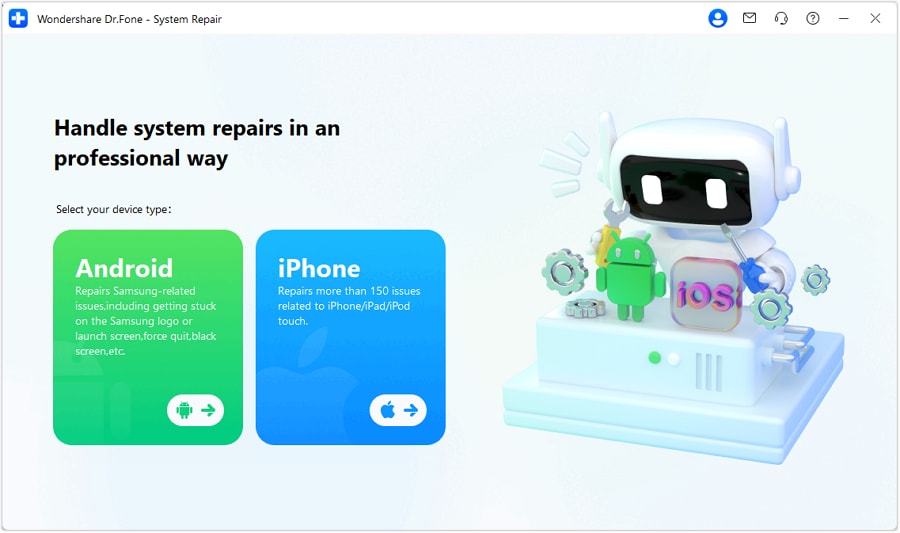
- Step 3: Continue With iOS Repair
The window that opens presents a set of options you can work on for the system repair of your iOS device. Select iOS Repair to continue for a system repair of your iOS device.
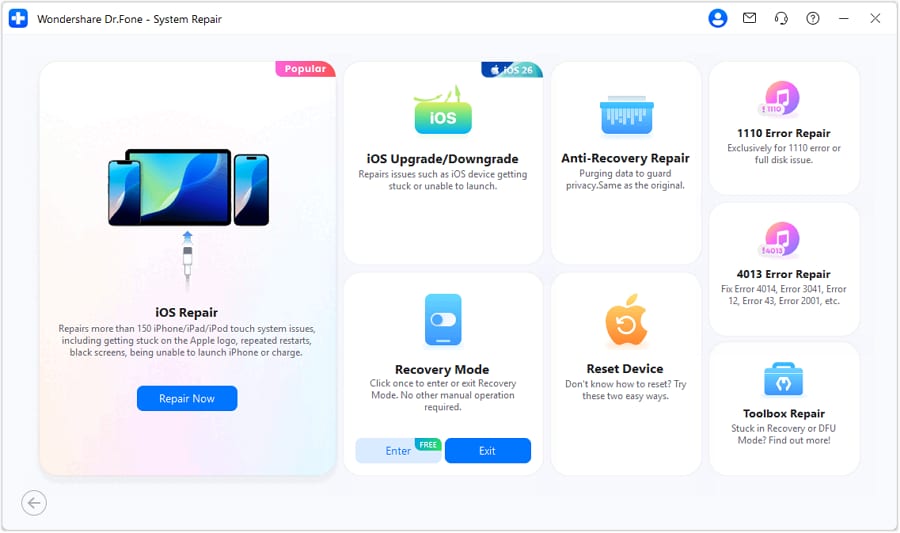
- Step 4: Select Standard Mode
The next window demands you select the repair mode for your iOS device. Select Standard Repair from the two options as you look forward to retaining the data during the process.
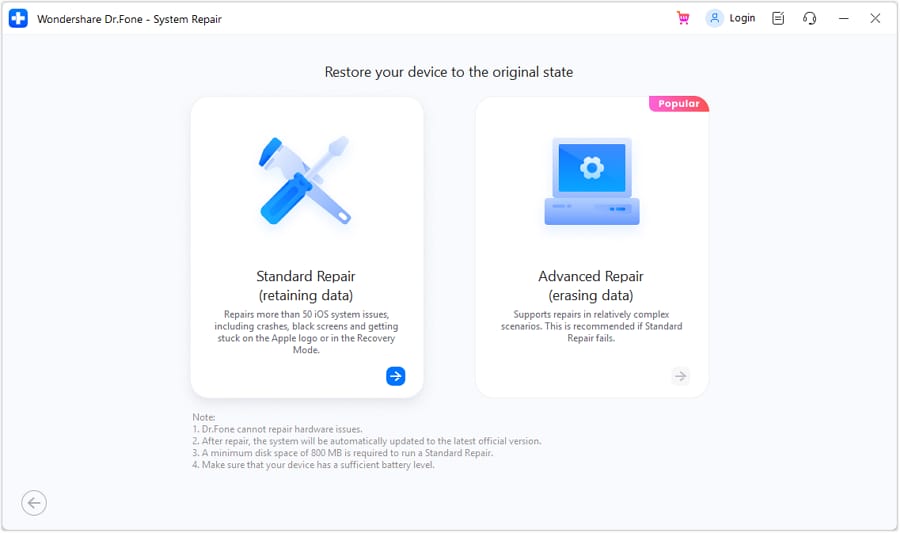
- Step 5: Put iOS Device in Recovery Mode
For the next step, you are advised to put your iOS device into Recovery Mode. By following the on-screen instructions, you can easily put your iDevice into Recovery Mode. Once done, tap Enter Recovery Mode to lead next. If not, click the Guide button to follow the instructions to put an unresponsive or abnormal device into Recovery Mode.
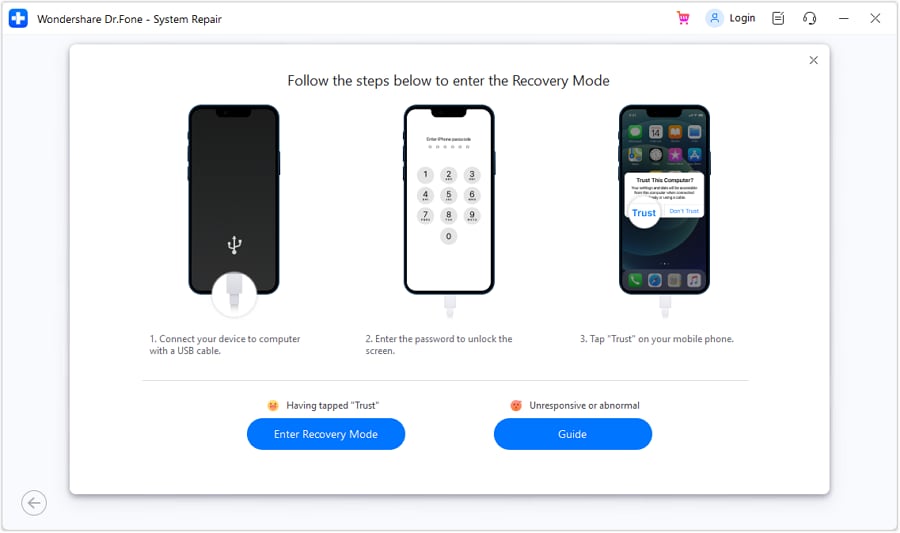
- Step 6: Download the Appropriate iOS Firmware
Once the iPhone 14 Plus device is in Recovery Mode, the platform will automatically detect the respective iOS firmware that can be installed in the device. Click Download against the iOS firmware you wish to install in your problematic device.
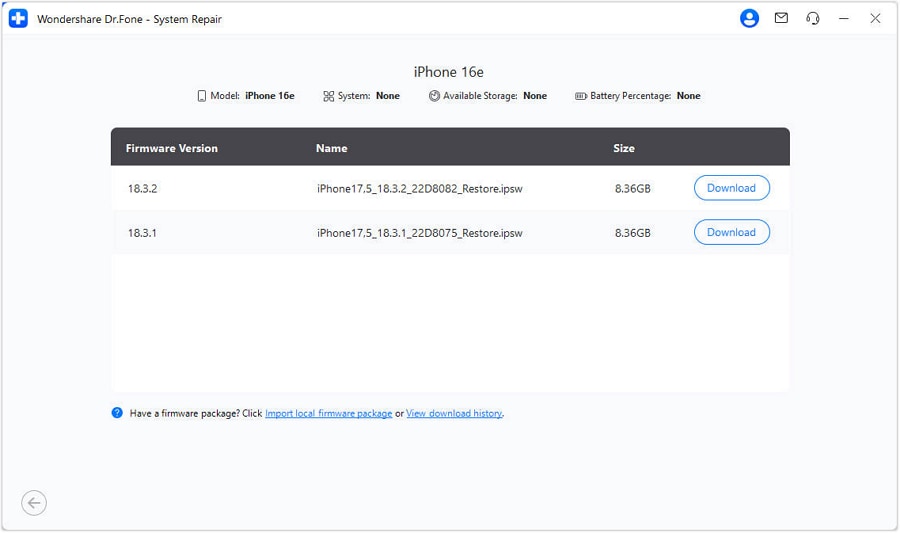
- Step 7: Start Downloading iOS Firmware
The device will automatically start downloading the iOS firmware on the platform. Once it downloads, it is verified by the platform before being made available for updating the iOS device.
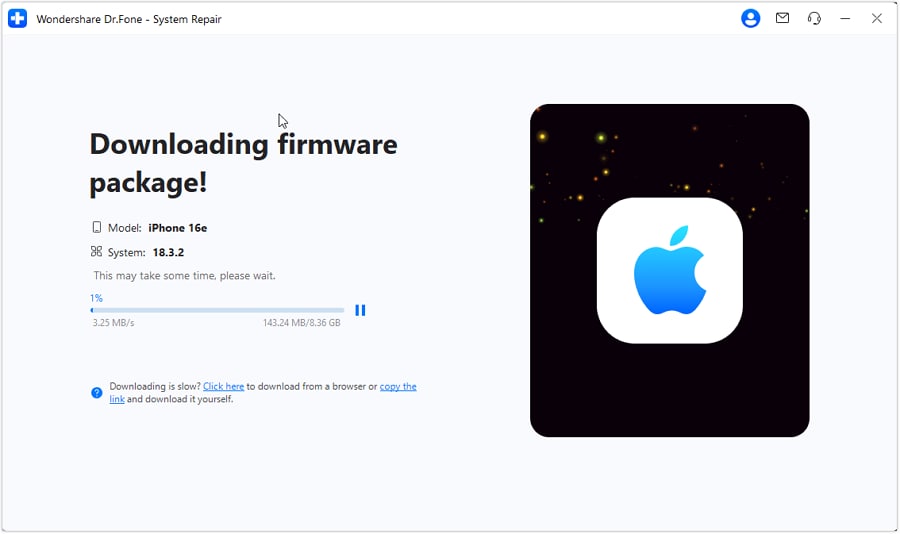
- Step 8: Continue to Install on iOS Device
Continue to click Repair Now to proceed with repairing your iOS device.
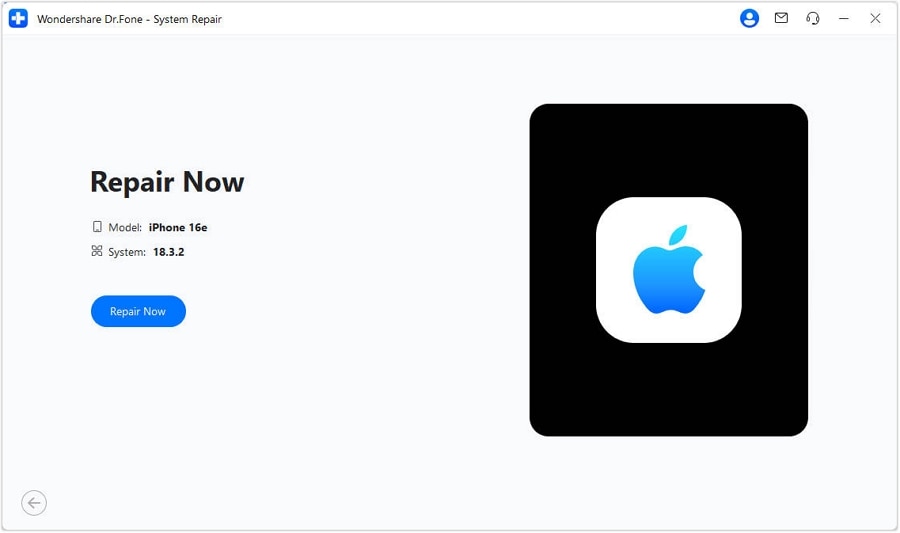
- Step 9: Observe the Installation Progress
The progress bar on the next screen shows the completion of the process. Wait until the process concludes, and make sure to keep the iPhone 14 Plus connected to the computer.
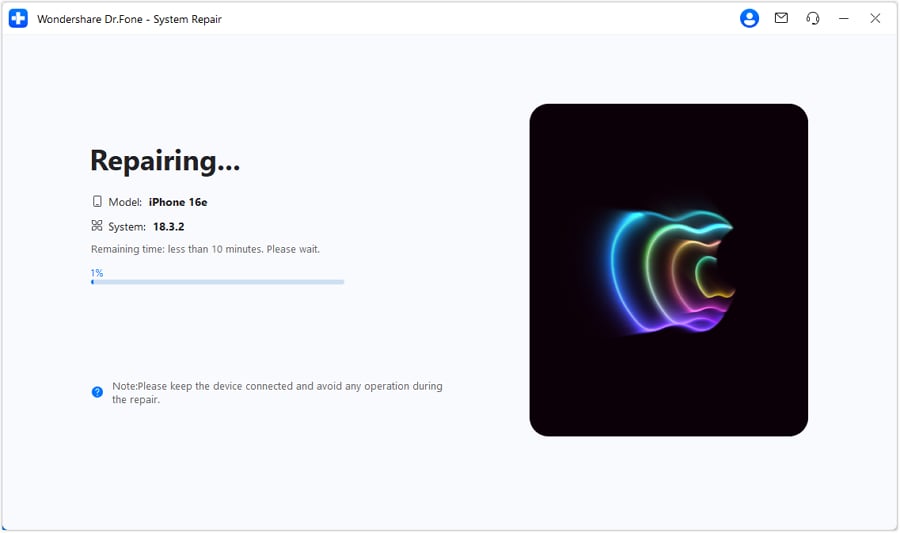
- Step 10: Repair iOS Device With Standard Repair
The following screen shows the completion of the process. Choose the Done option to conclude the entire repair process and use your iOS device easily.
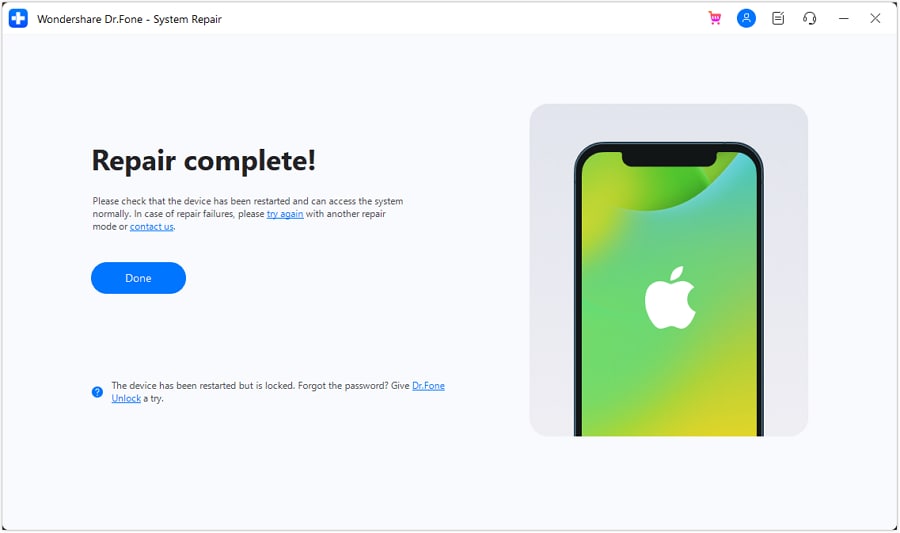
Part 2: iOS Advanced Repair
If Standard Repair does not work for you and you cannot repair your iOS decvice with it, Dr.Fone - System Repair (iOS) provides the unique functionality of Advanced Repair. This particular mode gives an in-depth check on the iDevice. It covers more serious issues involving the device’s system, but please note that it also erases all the data within it. Thus, it is best to back up your iDevice’s data before you consider practicing an iOS Advanced Repair.
- Step 1: Select Advanced Repair
Proceed to select Advanced Repair from the options; however, make sure to perform a complete backup of your device’s data before performing the operation on it.
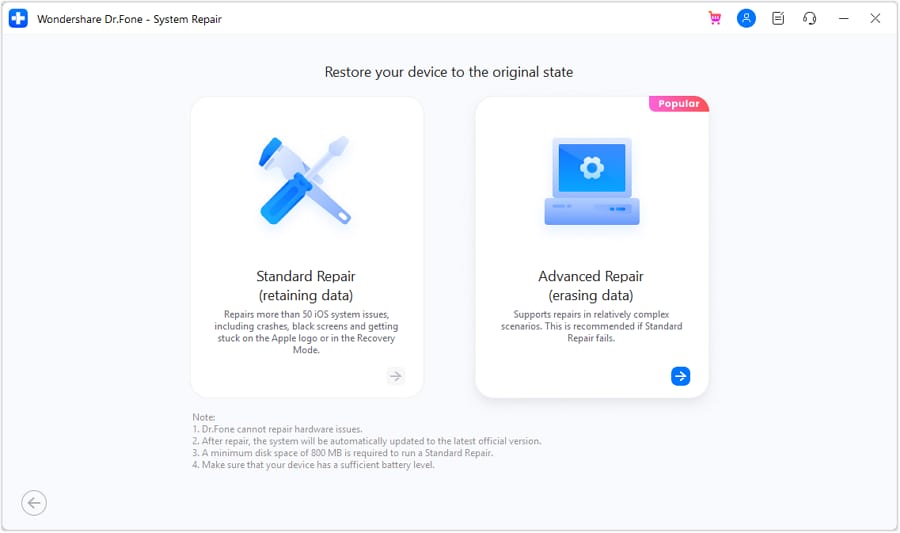
- Step 2: Put Device in Recovery Mode
On the next screen, you will find a guide explaining how to put your iOS device in Recovery Mode. Select the Enter Recovery Mode option if you have successfully been able to do it. However, if you find the screen to be unresponsive, click Guide to lead to another page that will provide you with comprehensive instructions on how to put the device in Recovery Mode.

- Step 3: Select iOS Firmware and Download
Once done, you will be prompted to another screen where you have to select the respective iOS firmware you want to download on your iDevice. Select Download adjacent to the respective iOS firmware to initiate the process.

- Step 4: Start Downloading the Selected iOS Firmware
The iOS firmware starts downloading on the platform, which will be verified before installation on the device.

- Step 5: Proceed to Install iOS Firmware on Device
As the firmware is ready for installation, click Repair Now to execute the process.

- Step 6: View the Installation Progress of the Firmware
You can view the completion of the installation through a progress bar.

- Step 7: Successfully Perform Advanced Repair
As the process concludes, a prompt window appears on the front showing a completion message. Click Done and check if your iOS device has been repaired.

How To Reset Your iPhone 14 Plus?
iOS devices that are causing multiple software and system issues need to be reset properly. Wondershare Dr.Fone - System Repair (iOS) comes with a proper system to reset the iOS device. With the help of the tool, you can reset your iOS device by following the guidelines provided below.
Note: Resetting your device may cause you to lose all of your data, including your contacts, photos, messages, and apps. By backing up your iOS data , you can ensure that you have a copy of all your important information and can easily restore it to your device after the reset.
Upgrade to the Newest Dr.Fone Manage Your Phone Wherever You Go
Index
Part 1: General Reset (Free Service)
For the first approach, you can consider the option of performing a general reset which needs to be executed manually by the user. While this does not erase any data of the iOS device, it puts all major settings of the iPhone 14 Plus device to default. Such an approach goes perfectly in situations where you have to resolve issues like not receiving notifications on iOS device or the phone network remains unavailable.
Follow the steps guided below to reset your iOS device properly:
- Step 1: Launch Dr.Fone and Access System Repair
Open Wondershare Dr.Fone after downloading and installing the latest version of the software on the computer. Continue to select Toolbox from the left section and redirect to selecting System Repair from the options.
Dr.Fone Mac version still has the old interface, but it does not affect the use of Dr.Fone function, we will update it as soon as possible.
- Step 2: Select the Nature of the Device
For the next window, select iOS to perform repairing operations for an iOS device.

- Step 3: Access Toolbox Repair
On the next screen, look for the Toolbox Repair option out of all available options since you are considering resetting your device.
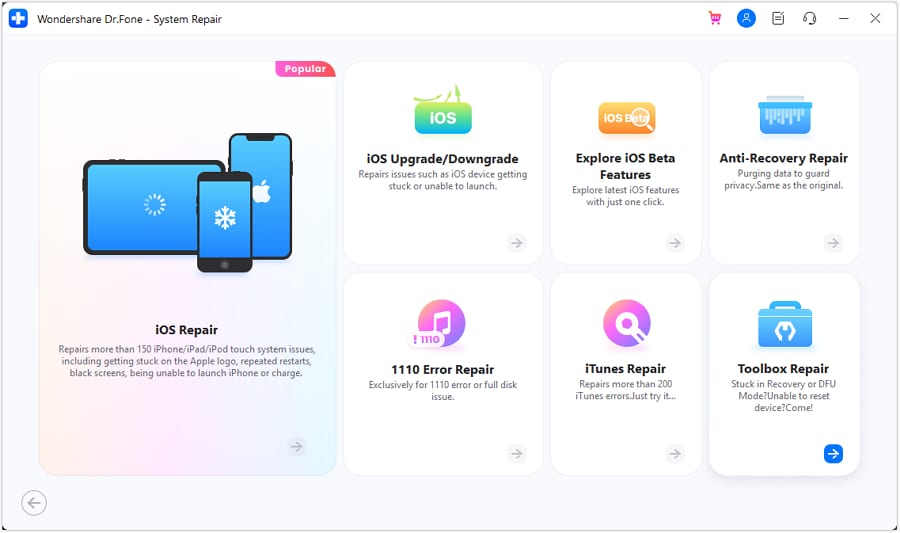
- Step 4: Continue to Reset iOS Device
As you lead to the next screen, multiple options appear on the front, out of which you are advised to select Reset Device.
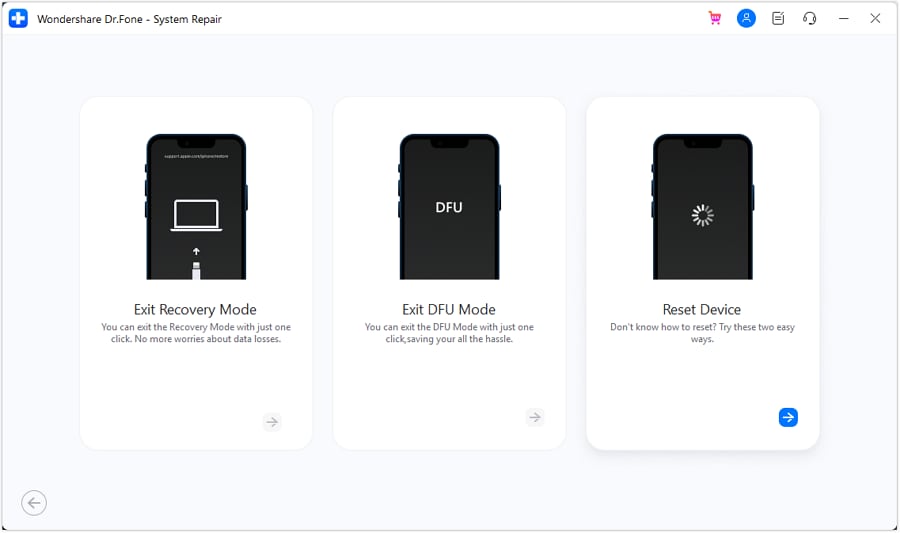
- Step 5: Proceed to a General Reset
This particular process is available in two different modes, out of which you have to select General Reset to continue.
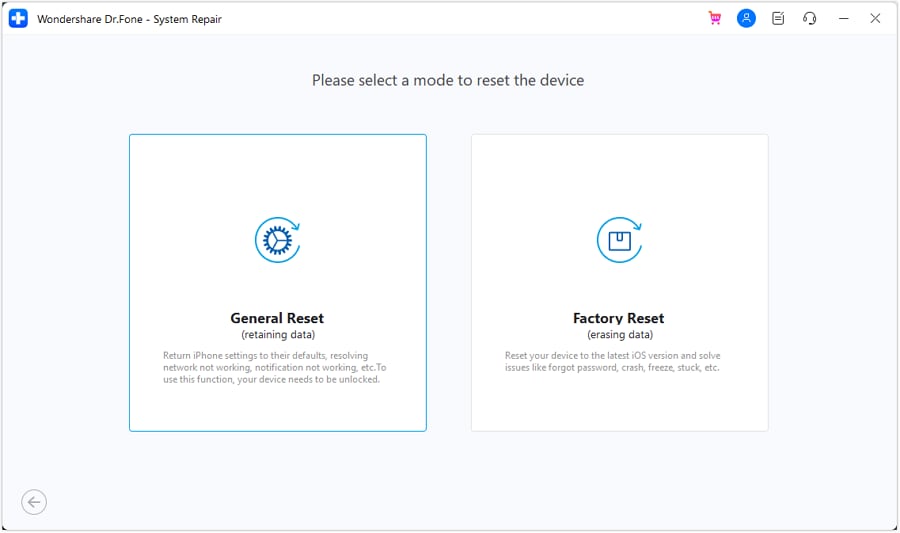
- Step 6: Follow the Instructions to Reset the Device
The screen that appears next displays a composite guide explaining how to reset your iOS device properly. Follow the on-screen instructions to execute the entire process manually.
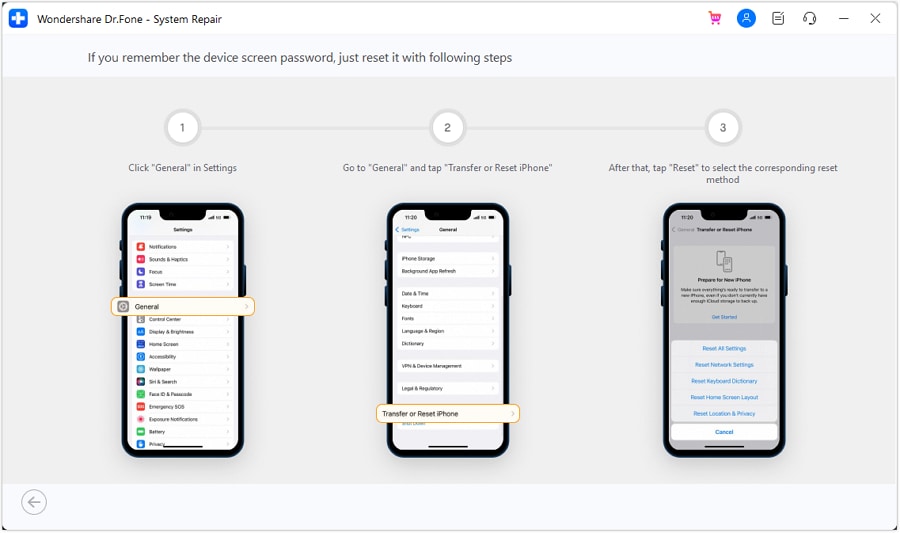
Part 2: Factory Reset (Paid Service)
In situations where you forget the password of your iOS device or get stuck at a point where it stops working, Dr.Fone - System Repair (iOS) comes with an option of performing a factory reset through the service.
For an understanding of how to reset your iOS device with Dr.Fone - System Repair (iOS) using the factory reset method, follow the instructions provided next:
- Step 1: Proceed to Reset Device Option
As you lead into the Toolbox Repair option, select the Reset Device button to proceed with resetting your iOS device.

- Step 2: Initiate Factory Reset on the Device
Continue on the next screen to select Factory Reset to perform a comprehensive reset on the iOS device.
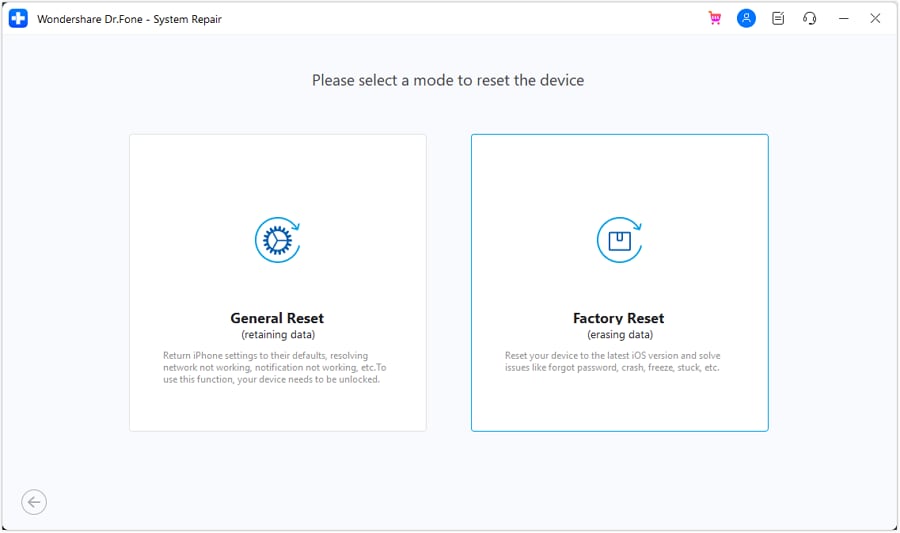
- Step 3: Put iOS device in Recovery Mode
On the next window, follow the on-screen instructions to put your iOS device in Recovery Mode. Select the model of the iPhone 14 Plus device according to your conditions. However, if you are not able to put your iOS device in Recovery Mode, click the Try DFU Mode option on the bottom-left of the screen.
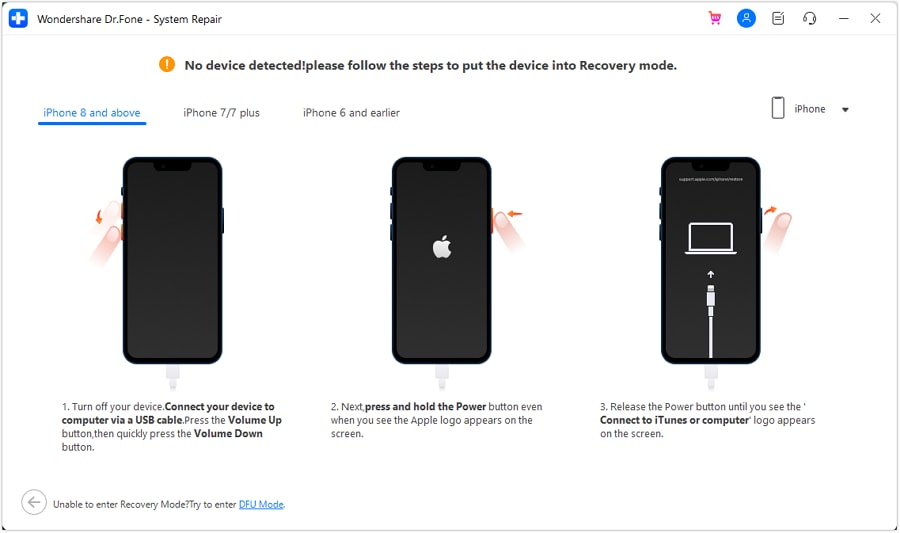
- Step 4: Download Respective iOS Firmware
Once the device is in Recovery or DFU Mode, the platform automatically detects the connected device and displays a set of iOS firmware that can be downloaded on the device. Click Download against any iOS firmware to initiate the download.

- Step 5: Start Installation of iOS Firmware
As the firmware starts downloading on the platform, it is made available for installation after verification.

For installing the iOS firmware on the device, choose the Repair Now option to proceed next.

- Step 6: Conclude Resetting the iOS Device
Not the progress of the iOS firmware on the following screen and wait until it is completely installed on the device.

A prompt message of completion will appear on the screen showing the successful installation of the iOS firmware on the device.

How To Repair iPhone 14 Plus iOS System Issues?
Dr.Fone - System Repair (iOS) comes with a unique and effective solution for system repairing for its iPhone/iPad/iPod users. Regardless of the nature of the error, this repairing tool repairs more than 150+ problems involving iOS/iPadOS. If you have been facing software issues with your iOS device, this iOS system repair tool is an effective solution.
Note: After using this function, your iOS device will be updated to the latest iOS version. And if your iOS device has been jailbroken, it will be updated to a non-jailbroken version. If you have unlocked your iOS device before, it will be re-locked.
Upgrade to the Newest Dr.Fone Manage Your Phone Wherever You Go
Part 1: iOS Standard Repair
The first method involves a standard repair against a problematic iDevice. If you are facing issues in managing the system problem within the iOS device, you can try this particular feature which retains the data completely. No data loss is recorded against iOS Standard Repair. To know how it is done, follow the steps described below:
- Step 1: Open System Repair Tool
Launch Wondershare Dr.Fone after successfully downloading the tool on your computer. Continue to the Toolbox section from the top-left section of the screen. Select System Repair from the list of options appearing on the home screen.

Dr.Fone Mac version still has the old interface, but it does not affect the use of Dr.Fone function, we will update it as soon as possible.
- Step 2: Lead to Select Device
As you connect your iOS device with a cable connection, you will be redirected to a new window where you will have to select the nature of the iPhone 14 Plus device. Since you are practicing iOS system repair, go for iOS in the window that opens.

- Step 3: Continue With iOS Repair
The window that opens presents a set of options you can work on for the system repair of your iOS device. Select iOS Repair to continue for a system repair of your iOS device.

- Step 4: Select Standard Mode
The next window demands you select the repair mode for your iOS device. Select Standard Repair from the two options as you look forward to retaining the data during the process.

- Step 5: Put iOS Device in Recovery Mode
For the next step, you are advised to put your iOS device into Recovery Mode. By following the on-screen instructions, you can easily put your iDevice into Recovery Mode. Once done, tap Enter Recovery Mode to lead next. If not, click the Guide button to follow the instructions to put an unresponsive or abnormal device into Recovery Mode.

- Step 6: Download the Appropriate iOS Firmware
Once the iPhone 14 Plus device is in Recovery Mode, the platform will automatically detect the respective iOS firmware that can be installed in the device. Click Download against the iOS firmware you wish to install in your problematic device.

- Step 7: Start Downloading iOS Firmware
The device will automatically start downloading the iOS firmware on the platform. Once it downloads, it is verified by the platform before being made available for updating the iOS device.

- Step 8: Continue to Install on iOS Device
Continue to click Repair Now to proceed with repairing your iOS device.

- Step 9: Observe the Installation Progress
The progress bar on the next screen shows the completion of the process. Wait until the process concludes, and make sure to keep the iPhone 14 Plus connected to the computer.

- Step 10: Repair iOS Device With Standard Repair
The following screen shows the completion of the process. Choose the Done option to conclude the entire repair process and use your iOS device easily.

Part 2: iOS Advanced Repair
If Standard Repair does not work for you and you cannot repair your iOS decvice with it, Dr.Fone - System Repair (iOS) provides the unique functionality of Advanced Repair. This particular mode gives an in-depth check on the iDevice. It covers more serious issues involving the device’s system, but please note that it also erases all the data within it. Thus, it is best to back up your iDevice’s data before you consider practicing an iOS Advanced Repair.
- Step 1: Select Advanced Repair
Proceed to select Advanced Repair from the options; however, make sure to perform a complete backup of your device’s data before performing the operation on it.

- Step 2: Put Device in Recovery Mode
On the next screen, you will find a guide explaining how to put your iOS device in Recovery Mode. Select the Enter Recovery Mode option if you have successfully been able to do it. However, if you find the screen to be unresponsive, click Guide to lead to another page that will provide you with comprehensive instructions on how to put the device in Recovery Mode.

- Step 3: Select iOS Firmware and Download
Once done, you will be prompted to another screen where you have to select the respective iOS firmware you want to download on your iDevice. Select Download adjacent to the respective iOS firmware to initiate the process.

- Step 4: Start Downloading the Selected iOS Firmware
The iOS firmware starts downloading on the platform, which will be verified before installation on the device.

- Step 5: Proceed to Install iOS Firmware on Device
As the firmware is ready for installation, click Repair Now to execute the process.

- Step 6: View the Installation Progress of the Firmware
You can view the completion of the installation through a progress bar.

- Step 7: Successfully Perform Advanced Repair
As the process concludes, a prompt window appears on the front showing a completion message. Click Done and check if your iOS device has been repaired.

- Title: How to Update iPhone 14 Plus to the Latest iOS/iPadOS Version? | Dr.fone
- Author: Vivienne
- Created at : 2024-07-17 03:24:54
- Updated at : 2024-07-18 03:24:54
- Link: https://review-topics.techidaily.com/how-to-update-iphone-14-plus-to-the-latest-iosipados-version-drfone-by-drfone-ios-system-repair-ios-system-repair/
- License: This work is licensed under CC BY-NC-SA 4.0.




